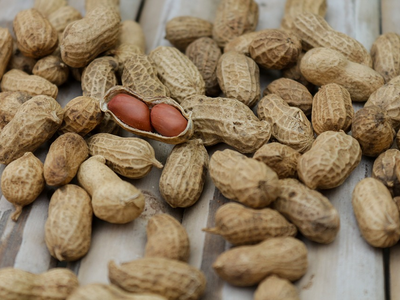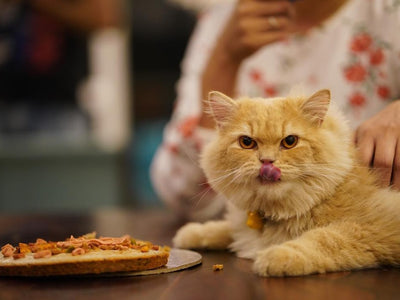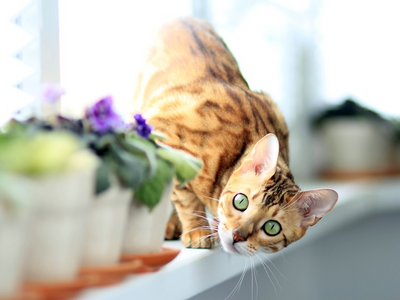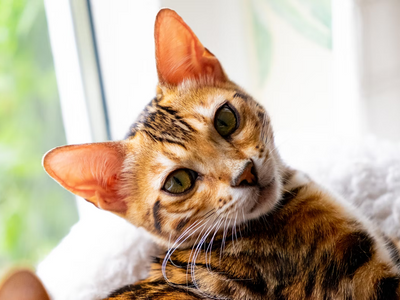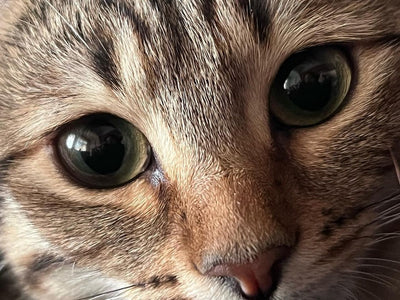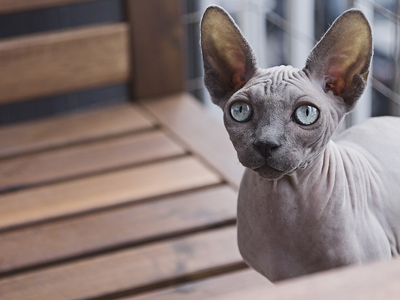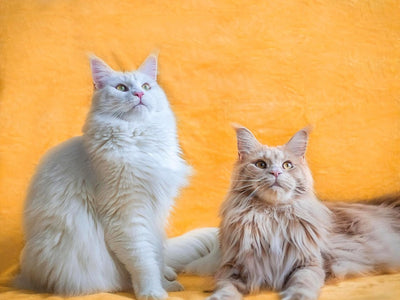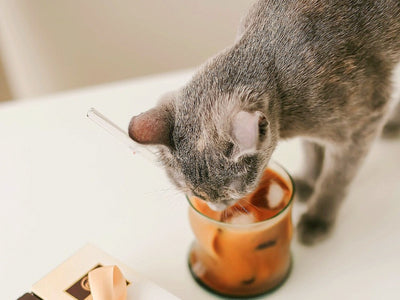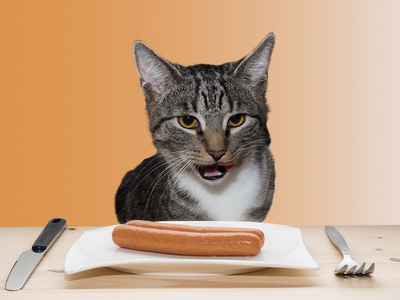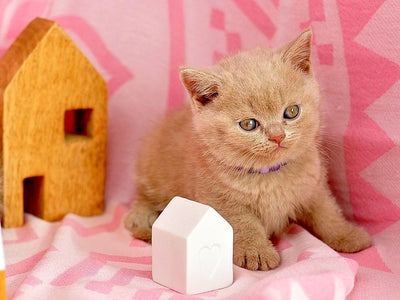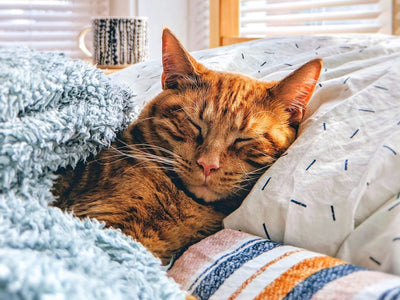21.09.2021
Why is my cat losing weight? Should I be worried?
It’s normal if your cat’s weight fluctuates throughout their life, but what should you do if you notice a steady or rapid weight loss in your cat? What can it mean?
If your furry friend is on the rounder side and has started melting off the extra weight after some dietary adjustments, that’s fine as long as they are losing weight gradually. If your feline’s had a healthy weight and started slimming down without you interfering with their diet, then there’s cause for concern.
If you feel suspicious about your cat losing weight, let’s find out what might be causing it and when the right time to call a vet is. You will also learn what cats should eat to get back on track and regain those precious pounds.
What are the leading causes of cat weight loss?
Seeing your furry friend lose weight without an apparent reason can be devastating. You might wonder whether something on your part caused it to happen or, even worse, an illness might be in question. If you noticed your cat losing weight, it’s most likely due to one of the following causes:
- Psychological stress
- Illness
- Food allergies
- Toothache
How can psychological stress cause weight loss in cats?
Stress can have a significant impact on our furry friends and cause them to avoid food. Cats can experience anxiety and depression just like humans do, and they usually express their feelings by avoiding food. If your feline is refusing to eat, keep an eye out for these potential stressors:
- Tremendous noise
- Introduction of new animals, especially if they are snooping around your kitty’s feeding area
- Any changes in routines, especially mealtime
- A litter box that’s too close to the feeding area
- The disappearance of another pet
- A dirty food bowl
To avoid stressing out your furry friend, make sure that:
- Their food bowl is always squeaky clean
- There are no other animals in the proximity of the bowl, especially during mealtime
- You serve food every day at the same time in the same way (for example, if you tend to warm up your cat’s meals, you might have to keep doing that)
- The litter box is close enough if needed, but far enough not to disturb your cat
- Nothing is causing too much of a stir, at least when it’s time to eat

Mooooooom, do I have to share?
Image (c) Untamed
Can an illness be the cause of my cat’s weight loss?
Weight loss can be one of the symptoms of a disease, especially if it’s occurring at a rapid pace. Let’s take a look at some of the conditions that are most commonly associated with abnormal weight loss in cats:
|
Condition |
Other symptoms to look out for |
|
Diabetes |
Your cat drinks much more water and urinates more frequently. You could also notice your cat acting sluggish and having a sweetly scented breath and urinary tract infections |
|
Feline infectious peritonitis (FIP) |
Cats with FIP seem like they don’t have any energy and struggle with a fluctuating fever that does not respond to medication |
|
Cancer |
Felines who are battling cancer tend to hide, be lethargic, and refuse to eat |
|
Chronic kidney disease |
Cats who suffer from chronic kidney disease use the litter box frequently and drink more water. You might also notice coat matting and a nasty breath that smells of urine |
If your cat refuses to eat and shows some of the other symptoms mentioned above, you should seek professional help.
Food allergies as the culprit behind a cat’s weight loss
Cat food allergies are usually accompanied by a lack of interest in food. If your cat is experiencing an allergic reaction, they are likely to lose weight. Cats who are struggling with persistent food allergies should not eat the following common allergens:
- Beef
- Lamb
- Seafood
- Corn
- Soy
- Milk, cheese, and other dairy products
- Wheat gluten
You should also try introducing hypoallergenic food options, such as single-source protein foods—and Untamed can help you with that! Satisfied cat parents report that our two single-source protein recipes helped calm down their cats’ nervous bellies:
- Chocka Chicken
- Tuck-in Tuna

Once your kitty dives into our Tuck-in Tuna, they will be hooked!
Image (c) Untamed
Signs your cat is losing weight because of toothache
When our tooth hurts, we simply chew on the other side. Cats’ anatomy doesn’t allow them to solve the problem that way, so they often avoid eating at all. Other oral issues that can cause your kitty to reject food and lose weight are:
- Mouth ulcers
- Gingivitis (inflammation of the gums)
You should suspect your cat is having trouble chewing their food for any of the above reasons if you notice them drooling or pawing at their mouth.
What if my cat is losing weight but still eating well?
Cats who eat well but are still losing weight might be having trouble with worms as they cause diarrhoea and increased appetite. Other symptoms of worms include severe bloating and an itchy bottom.
An old cat losing weight but still eating might struggle with thyroid or kidney disease, both commonly observed in senior cats. If you notice your senior cat getting skinny but still eating a lot, it can also be a sign that your furry friend is reaching the end of their time with you. Organ failure doesn’t allow your cat to absorb the nutrients they need, so they try to compensate by eating more.

Human, didn’t I tell you I like that one better?!
Image (c) Untamed
Why is my kitten losing weight?
Kittens should grow rapidly, so any weight loss is abnormal and should be inspected by a professional. If you consult a vet, some of the questions they might ask you are:
- Is the queen feeding her kittens, or are you feeding them formula?
- Are any of the queen’s nipples damaged?
- How many kittens from the litter are losing weight?
- How old are the kittens?
Leading causes behind kitten weight loss
Kittens should never lose weight. Even a slight decrease in their body mass can be fatal, and because of that, it’s vital to weigh them daily. If you notice a decline in the progress of one or more kittens, it’s most likely because of:
- Fading kitten syndrome
- Slow weaning
- Large litter
What is fading kitten syndrome (FKS)?
Fading kitten syndrome (FKS) is a term used to describe the state of a kitten whose health seems to be declining suddenly and out of the blue. Factors that cause fading kitten syndrome include:
- Congenital defects
- Hypothermia (being too cold)
- Hypoglycemia (insufficient blood sugar levels)
- Neonatal isoerythrolysis—a condition where the kitten’s parents have different blood types. Queens with blood type B have a large number of antibodies that can be found in the milk and that attack type A blood cells that kittens can inherit from their father. When an A blood type kitten nurses from a queen with blood type B, the kitten’s health can deteriorate quickly
A kitten suffering from FKS will:
- Vocalise profusely
- Breathe heavily, with their mouth open
- Feel cold to the touch, especially in their limbs
- Be unable to stand
- Not respond to touch
How to treat fading kitten syndrome
FKS is typically fatal, but with a quick response, your kitten might survive, and their condition might improve.
To prevent a fatal outcome, you need to:
- Provide warmth:
- Wrap your kitten in a blanket, leaving only their face exposed
- Provide an extra source of heat, such as a heating pad, hot water in a Ziploc bag, or a sock with rice you warmed up in the microwave
- Increase your kitten’s blood sugar:
- Find Karo corn syrup or maple syrup or mix equal parts of sugar and warm water until the sugar dissolves
- Fill a syringe with the substance of choice or use your finger to apply the source of sugar to the kitten’s mouth gently
- Repeat the process every three minutes
- Look for signs of progress—if the kitten starts to get better within 20 minutes of ingesting the substance, they have a good chance of survival
How does slow weaning affect kitten weight loss?
Most kittens start weaning during week five or six, but some (especially runts of the litter) have difficulty switching to solid food, which can cause them to reject food and lose weight. Your kitten must start munching on dampened dry food or canned food since the queen won’t let the litter feed off her for much longer.
If you have slow weaners in your litter, you can encourage them to eat more by:
- Warming up their solid food
- Placing a tiny amount of food on your finger and rubbing it on the kittens’ gums and teeth. Do not force the food into the kittens’ mouths because that can lead to choking and food inhaling
- Providing a variety of foods to see if the kittens have a particular preference
Weight loss in kittens due to a large litter
When a cat gives birth to a large litter, she might have insufficient teats to feed them all simultaneously, leading to kittens fighting with each other, pushing away the runt of the litter, and even hurting the queen’s teats. It’s easy to spot the runt of the litter as they are often smaller, weaker, and slower to progress in general.
If you have a large litter, you can approach the issue in two ways:
- Allow half of the kittens to feed at a time
- Separate the runt from the queen and feed them with formula
When is the right time to call a vet?
The reason behind your cat’s weight loss can be anywhere between minor and severe, but you won’t know until you consult a professional. Whenever you notice your cat losing weight, you should call or visit the vet as soon as possible to get your kitty diagnosed and treated properly.
Why strict diets are a cat’s worst nightmare
Sudden weight loss in cats is often observed in cats whose parents put them on a strict diet to improve their health. While a caloric deficit is necessary to reach optimal weight, a sudden and significant decrease in food intake can cause many problems to your cat as they won’t have enough energy to keep their body functioning properly.
Nutrient deficiency can be equally (if not even more) dangerous to cats than overfeeding and will significantly impact your cat’s well-being. It causes all major functions in a feline body to fail, including:
- Growth (hair, claws, regeneration)
- Energy generation
- Maintenance of bone flexibility and sturdiness
How to help your cat feel pawsome even when on a dietary regime
Make sure your cat receives all the essential nutrients—protein, fats, vitamins, and minerals—through their food, even when on a diet. Keep the following in mind if you want your cat to lose weight in a healthy way:
- Dry food is typically richer in calories than wet food because it contains more carbs and less proteins. While a small portion of protein-rich wet food is enough to satiate your kitty, dry food may require larger serving portions
- The food’s protein and fat content is your cat’s energy source. Being carnivores, cats should metabolise proteins and fats to get their daily calories. Ideally, cat food containing 50% or more protein content and up to 20% fat provides adequate calories to cats. More active cats require more energy, while less active felines will often skip a meal because they didn’t spend their energy reserves
- Cats get most of their nutrients out of quality whole meats. Amino acids are the building blocks of a cat’s body. Cats can generate some amino acids on their own, but only if they get the essential ones through animal-based protein
How to help your furry friend recover from weight loss
After a visit to the vet and getting proper treatment, your cat should feel better in no time. You can make the recovery process much easier on them, and here’s how:
|
How to help your cat recover from weight loss |
Description |
|
Make your cat feel cosier |
Your cat might take more frequent naps and sleep more during recovery. If your kitty allows you to, wrap them in a blanket or provide some extra pillows during nap time |
|
Remove food your cat isn’t interested in from the bowl |
Food left in the bowl for too long can spoil and cause your cat’s tummy some extra trouble. If your kitty isn’t particularly interested in a meal, don’t leave it sitting in the bowl |
|
Introduce a high-protein after consulting a vet |
A diet rich in essential nutrients can help your cat get back on their feet after a significant weight loss. You might have to encourage your cat to eat, though, but you can do that by warming up the meals slightly below body temperature and opting for jelly and gravy recipes—they are more pleasing to your cat’s sophisticated palate and help keep them hydrated |
If you’re looking for a nutrient-rich, tailor-made diet that will help your cat maintain their optimal weight, try Untamed!
Helping your cats grow and stay strong and healthy—tin by tin
From kittenhood to their golden years, Untamed strives to provide cats of any age all they need to thrive. We use fresh, human-grade ingredients and steam-cook them gently to ensure all the nutrients stay in place. Our assortment features a variety of recipes that will satisfy even the fussiest eater. All Untamed formulas are made exclusively from the best:
- Chicken (whole meat as well as the liver)
- Sardines
- Shrimps
- Duck
- Ham
- Salmons
- Mackerels
- Tuna

Only the freshest, best-quality ingredients make it to our final cut.
Image (c) Untamed
Members of the Untamed pack report that our perfectly sized portions help their cats achieve and maintain healthy weight long-term. Other benefits include:
- More fun playtime due to cats’ higher energy levels
- Fewer hairballs to deal with thanks to a softer and healthier coat
- Less messy litter boxes thanks to vet-formulated ingredients that are easier to digest
Your feline companion deserves only the best quality food, and we can help you provide that.
Are you ready to make the switch? With all the poor quality food on the market, we would be suspicious, too. You never know until you try, though, which is why we offer a starter box to help you and your cat decide! Visit our Try Now page to get started!
Try Untamed—your cat will thank you!
Untamed delivers the experience of a home-cooked meal without the time-consuming and messy process that typically comes with it. Signing up for cat food online and getting a steady stock of your cat’s favourite meals delivered to your doorstep takes only a few moments of your time. Here's what you should do:
- Visit our Try Now page and tell us about your cat
- Review the sample meal plan
- Place your order
You will get your starter box within a day, and it will last you about a week. If you want a regular supply, we can send recurring monthly cat food deliveries for your precious kitty. In case you want to modify your order, or postpone, pause, or skip a delivery—let us know, and we’ll honour your request immediately. Besides taking good care of our feline friends, we also care for the planet by using sustainable (but still functional and, dare we say, gorgeous) packaging.

If I fit, I sit.
Image (c) Untamed

![Associated image for What human food can Sphynx cats eat? [Comprehensive list]](http://untamed.com/cdn/shop/articles/what_human_food_can_sphynx_cats_eat_Featured_400x300_crop_center.jpg?v=1648705074)
